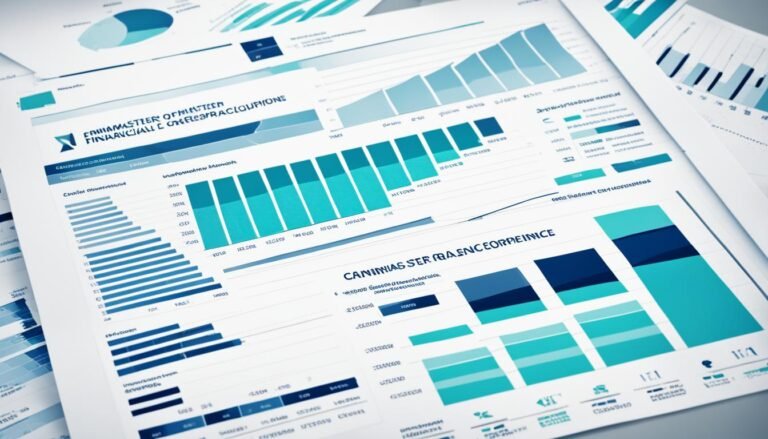Review of Master of Science in Risk Management (MSRM) Programs
Risk management is key for both financial and non-financial businesses to stand strong and grow. As global markets get more complex and unpredictable events loom, the need for experts in risk management is at an all-time high.
Master of Science in Risk Management (MSRM) programs are here to prepare you for this challenge. Top institutions like NYU Stern and Georgetown University offer these programs. They cover everything from the basics to specialized areas of risk.
MSRM programs give you a well-rounded view of risk, from the ground up. You will learn about financial risk from a strategic angle. You’ll pick up skills to spot, evaluate, and deal with risks. And you’ll put your knowledge to the test in real-world projects.
These programs are for both professionals already in the field and recent grads. By completing an MSRM program, you set yourself up for success in risk management.
Key Takeaways:
- MSRM programs cover all key dimensions of risk encountered in financial services firms and non-financial businesses.
- Programs offer a flexible format, including part-time options and online distance learning platforms.
- The curriculum includes foundational topics, key risk domains, the risk environment, and practical components.
- Accredited programs like NYU Stern’s MSRM program ensure quality standards are met.
- The skills and knowledge gained from an MSRM program open up a wide range of career opportunities in risk management.
Program Format and Structure
The Master of Science in Risk Management (MSRM) programs provide a deep dive into risk handling. They give students the tools and knowledge to shine in their careers. The schedule is flexible, great for those also working.
This MSRM program lasts a year. It’s part-time, so you can work and learn at the same time. Classes are throughout two years, making it easier to juggle everything.
Classes mix face-to-face and online. With online platforms, you can study anywhere, anytime. This makes it easier to fit the program into your life.
MSRM students see the world through global classes. They get a peek into how risk is managed around the globe. It makes them ready for a diverse risk management landscape.
Curriculum Structure
MSRM studies include foundational, risk domain, and real-life practice lessons. They build a strong base and then dig deeper into different risk types like credit or operational risk. This gives students hands-on experiences with managing real-world risks.
The basic courses teach key concepts. They include topics like how to assess and reduce risks.
Later courses focus on specific risk types. Students get in-depth knowledge on handling different risks.
Then, there are practical lessons to apply what students have learned. These can be simulations or working on real case studies. This way, students get ready to face risks in their careers.
The MSRM format and coursework provide a complete risk management education. They’re perfect for working folks looking to step up in risk management.
| Program Format and Structure | Program Advantages |
|---|---|
| One-year, part-time format | Allows students to balance work and study |
| Multiple on-site class sessions or modules | Facilitates in-depth learning and interaction with faculty |
| Online distance learning platforms | Provides flexibility and convenience for students |
| Global locations for class sessions | Offers a global perspective on risk management |
| Curriculum structure | Includes foundational, key risk domain, and practical courses |
Accreditation and Faculty Credentials
Accreditation helps ensure MSRM programs meet high quality standards. For instance, NYU Stern’s MSRM program is certified by top groups like PRMIA and GARP. This certification shows the program’s excellence in teaching risk management.
The faculty in these programs are highly qualified. They bring a wealth of experience from teaching around the world. They have hands-on knowledge thanks to their own research and work in risk management.
For example:
“Accreditation is key in showing program quality. It proves MSRM programs have met strict reviews by experts. Groups like PRMIA and GARP are crucial in this. Their stamp of approval means students get top-notch skills and knowledge.”
Image:
Curriculum Overview
The MSRM programs teach students all about risk management. They learn to face the tough jobs in the industry. This includes knowing about various risks, the risk scene, and how to make good decisions.
Foundations of Risk Management
The basic courses aim to give a shared knowledge in managing risks. Students learn key principles and ways to handle risks well. They cover essential topics like spotting risks, judging them, analyzing them, and cutting them down.
Key Risk Domains and Their Applications
Students get deep into different risks and their impact on businesses. They study credit risk, which looks at the chances of borrowers not paying back. There’s also currency risk, which looks at money value changes, and more. This includes operational risk, dealing with internal issues.
The Risk Environment
The risk environment courses look at risk management in a big picture way. They touch on behavioral finance, how organizations are designed, and laws. Students see how these things affect managing risks.
Practical Components
Doing practical work is a big part of the courses. Students get to use what they’ve learned in real-world situations. This might be through a strategic risk project, case studies, or hands-on exercises.
The courses offer both theory and practice in risk management. Students learn through talks, working in groups, and actual experiences. This gives them the tools to handle risks in today’s fast-changing business world.
Program Rankings and Top Programs
Choosing an MSRM program means understanding their quality and name. Many schools are known for great MSRM programs. They’re chosen based on their reputation, teachers’ backgrounds, what you learn, and how well past students have done.
The University of Washington, Georgetown University, Columbia University, and Texas A&M University are among the best. They’re famous for their MSRM degrees and the careers their graduates have.
Looking at these rankings helps you find MSRM programs that match your goals. Picking a top program means you can trust in its quality and the skills it’ll give you in risk management.
Top-Ranked MSRM Programs
| Rank | Institution | Location |
|---|---|---|
| 1 | University of Washington | Seattle, Washington |
| 2 | Georgetown University | Washington, D.C. |
| 3 | Columbia University | New York, New York |
| 4 | Texas A&M University | College Station, Texas |
Top MSRM programs are known for their tough courses, great teachers, and successful students. Choosing a program from this list means you’re on the right path for a master’s in risk management.
Career Opportunities and ROI
MSRM program graduates find a world of job chances in risk management. They have the know-how needed for jobs in many places. This includes banks, big companies, and even the government. What they learn in these programs is highly valued by the industry.
Getting an MSRM degree can lead to better jobs and more money. More and more, businesses are looking for people who understand risk management. So, those with an MSRM education are in a good spot.
“With my MSRM, I got a job as a risk manager at a big finance hub. My role is to look out for risks and lower them. The program taught me everything I need, and it’s helped me move up and do well financially.”
– John Smith, MSRM Graduate
Those with an MSRM degree really stand out in their careers. They help businesses deal with risks smartly. Their skills are crucial in today’s risk-filled world.
| Career Paths | Job Opportunities |
|---|---|
| Risk Manager | Financial Institutions |
| Risk Analyst | Regulatory Organizations |
| Compliance Officer | Government Agencies |
| Regulatory Specialist | Multinational Corporations |
| Financial Consultant | Specialist Financial Boutiques |
| Strategic Planner |
Online MSRM Programs and Flexibility
Online MSRM programs let working professionals earn a master’s in risk management with ease. They’re designed for flexibility, allowing students to learn and finish tasks at their own time. This way, they can manage work, family, and study without conflict.
These online courses match the quality of those taught on campus. They offer a lively learning environment where students from different places can work together. This structure ensures top-notch education is combined with the freedom of online study.
In online MSRM programs, you can set your own study times. Whether it’s early morning or the weekend, it’s up to you. This means you can keep your job while getting better at risk management.
What’s more, these programs include videos, interactive tools, and real-life examples for learning. You can use them anytime to improve your understanding and skills in risk management.
“The online format of the MSRM program has been a game-changer for me. I can pursue a higher degree in risk management while still working full-time. The flexibility and convenience have allowed me to balance my career and education effectively.”
– Nicole Torres, Online MSRM Program Graduate
Online MSRM programs are great for those who want to learn at their own pace. They’re perfect for boosting current careers or starting new ones. With the right education and skills, you can thrive in the exciting world of risk management.
Top-Ranked MSRM Programs
When comparing MSRM schools, students often look at program rankings. Certain schools stand out. They’re known for their excellent courses, top-notch teachers, and successful graduates.
According to various sources, these programs are the best:
- University of Washington
- Georgetown University
- Columbia University
- Texas A&M University
- Indiana University
The reputation of these schools is well-deserved. They provide a thorough education in risk management. Their teachers have lots of experience. This makes learning more meaningful. The education they offer prepares students well for careers in risk management.
If you’re considering MSRM schools, think about these top programs. But remember, choose a program that fits your goals. Look for features that match what you want from your education.
Career Outcomes from Top-Ranked MSRM Programs
Graduates from top MSRM programs have many job options. They are ready to work in risk management roles in any industry.
Employers love the skills these graduates have. These skills include risk assessment, problem-solving, and planning. Jobs in banking, insurance, consulting, and more are waiting. Plus, the need for risk managers is growing. So, graduates usually find good jobs quickly.
Next, we’ll explore the job options and benefits of having an MSRM degree.
Alumni Network and Partnerships
MSRM programs are great because they help students build a strong alumni network. This network links grads from different years, giving them a community where they can share knowledge, make professional contacts, and find job opportunities. It’s a place where alumni can learn about industry trends, meet important people, and get advice from seasoned pros.
The MSRM alumni network isn’t just about who you know. It’s a way to talk about the best ways to handle risks and to brainstorm about new risk management methods. Alumni get to have important discussions, swap ideas, and even work together on projects or industry efforts. The network also offers a way to find special job chances, as alumni share job openings within their companies or help other alumni get jobs.
Besides the alumni network, MSRM programs also join forces with pro groups and business associations to add even more value for students and alumni. These partnerships can be with top risk management groups like PRMIA and GARP. They make it easier for alumni to keep learning, stay connected with the industry, and attend important events.
Plus, because of these partnerships, MSRM grads might not have to take some professional exams. This saves them time and energy. These exam exemptions happen because MSRM programs are serious about their teaching and high academic standards. So, students can go for certifications like PRM or FRM, knowing they got a great education from their MSRM program.
Thanks to the alumni network and program partnerships, MSRM grads can be active in the risk management field, keeping up to date with the latest trends. These connections and partnerships are all about working together and helping everyone achieve more. It’s a way for grads to keep learning throughout their careers and to grow professionally.
Benefits of Alumni Network and Program Partnerships
| Benefits | Description |
|---|---|
| Knowledge sharing | Access to insights, best practices, and industry expertise shared by alumni and professionals |
| Networking opportunities | Establishment of valuable connections with professionals, potential mentors, and industry leaders |
| Access to career opportunities | Enhanced visibility to exclusive job openings and referrals within the alumni network |
| Professional development | Opportunities for continued education, certifications, and access to industry resources |
| Exemptions from certification exams | Recognition of the comprehensive curriculum, resulting in exemptions from professional certification exams |
Note: The above table showcases the key benefits of alumni networks and program partnerships for MSRM graduates, highlighting the competitive advantages gained through these connections and collaborations.
Career Paths with an MSRM Degree
MSRM graduates can choose from many career paths. The program equips them with skills to handle risks in various settings. This leads to jobs in banking, insurance, consulting, government, and finance.
- Risk Manager: Responsible for identifying, assessing, and mitigating risks within an organization.
- Risk Analyst: Analyzes data to identify potential risks and recommend risk management strategies.
- Compliance Officer: Ensures that an organization’s practices and policies comply with relevant laws and regulations.
- Regulatory Specialist: Works with regulatory agencies to ensure compliance with industry-specific regulations.
- Financial Consultant: Provides expert advice on risk management strategies and financial planning.
- Strategic Planner: Develops and implements risk management strategies to support an organization’s long-term goals.
The need for risk pros is on the rise, giving MSRM grads many chances. Their unique skills help them influence organizations positively. They manage risks well and lead sustainable growth.
Testimonial:
“My MSRM degree opened doors to exciting career opportunities in the financial services industry. I now work as a Risk Manager at a leading investment bank, where I can apply my knowledge and skills to make informed business decisions and protect the firm from potential risks. The MSRM program provided a solid foundation for my career and gave me the confidence to pursue my passion in risk management.” – Jessica Thompson, MSRM Graduate
Program Application and Admissions Criteria
Applying for an MSRM program is a key step towards a Master of Science in Risk Management. Let’s look at how you can apply and what’s needed to get into MSRM programs:
Application Process
First, you start by filling in an online application form. This form asks for your personal details, school history, and job background. You must also include specific documents with your form:
- Resume/CV: Update your resume with details about your jobs, skills, and any important certificates you have.
- Essays: Write essays that show why you’re into risk management, your future career plans, and what getting an MSRM degree means to you.
- Recommendation Letters: Get professional letters of recommendation. They should talk about your skills, how well you work, and achievements from past jobs that relate to risk management.
- Transcripts: Send in your official school transcripts to prove your academic history and GPA.
Some programs might ask for a writing sample or a fee as well. After you’ve sent in everything, you might get asked for an interview before a final decision is made.
Admissions Criteria
Each MSRM program has its own rules for who they admit. Most programs look at these key points when deciding:
- Bachelor’s Degree: You’ll need a bachelor’s degree from a recognized school. While any major is okay, they like to see if you studied finance, economics, or business.
- GPA: A good GPA, usually 3.0 or higher, shows you do well academically. It also proves you can handle the tough work in the program.
- Work Experience: It’s great if you’ve worked in risk management, finance, or business. This helps you and your classmates learn from real-world experiences.
- Interest in Risk Management: Schools like to see you’re passionate about risk management. Show this through your work, research, or why you’re interested in the field.
- Quantitative Analysis Skills: Some programs stress math and stats. You might need to be good at numbers to get in. Show your skills with your classwork or any certificates.
- Standardized Test Scores: A few programs want to see your GMAT or GRE scores. These tests help schools understand your academic skills.
It’s important to know what each program wants and make sure you meet those standards before you apply. Start early because openings in MSRM programs fill up fast, and many people often apply.
The application and admission rules aim to find students who will do well in the MSRM curriculum. By following these steps carefully, you can improve your odds of joining the MSRM program of your choice. Enjoy this exciting part of your educational journey.
Conclusion
Master of Science in Risk Management (MSRM) programs are top-notch for those wanting to excel in risk management. These courses are designed to fit around your work life. They delve into important risk management areas, giving students skills to navigate risks in financial and non-financial sectors.
MSRM programs have teachers who know their stuff from real work experience. Their lessons make learning more interesting and practical. After graduating, students step into various fields like banking, insurance, and more. Thanks to their risk skills and strategic thinking, they become assets in any company.
Getting a degree in MSRM is a solid investment. The job market for risk management experts is expanding. Thus, MSRM grads are in high demand. Their education and hands-on skills are ready to shine in any company. By earning an MSRM degree, you not only better your career but also help keep businesses stable.








